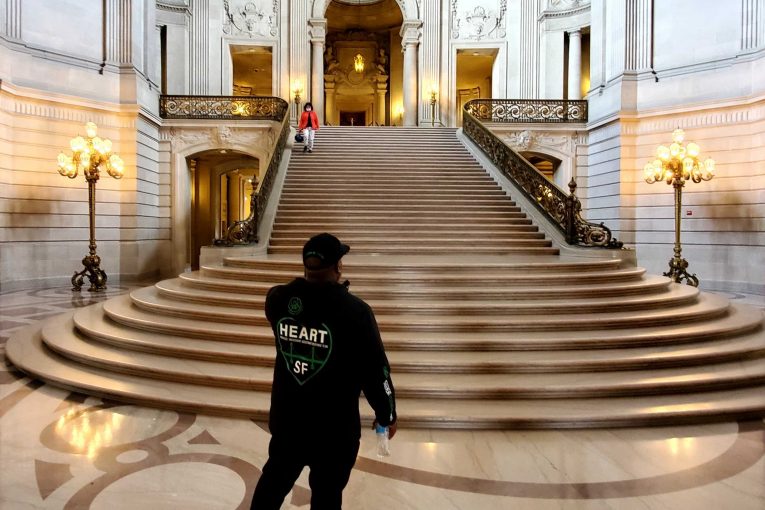

By Rodney Wrice
In a society where media outlets play a pivotal role in shaping public opinion, it is not uncommon to witness certain stories being brushed under the rug or omitted altogether. Urban Alchemy, a nonprofit founded in 2018 by Dr. Lena Miller to transform urban spaces and reshape the narrative of those faced with homelessness, addiction and mental illness by using the transferable skills of long-term offenders, has faced its fair share of challenges in gaining positive media coverage.
I expressed thoughts seeking to shed light on why news outlets and newspapers tend to shy away from publishing stories that showcase Urban Alchemy’s positive impact on marginalized communities.
Urban Alchemy, a transformative force in communities, has produced a remarkable roster of highly skilled professionals who are making a significant impact on society. Among them are high-level business contractor Ian Clark-Johnson who served more than 20 years behind bars and returned as one of the best in his line of work, social change trainer Louie Hammonds serving 21-plus years has done the same in educating and training men and women into being better versions of themselves when working from a trauma-informed lens which has taught them how to apply this model with community members as a whole.
Then there’re residential service directors Brian Shepperd and Everett Butler who combined have more than 55 years in prison. In addition, community-based public safety directors James Hegler, Jeff Dickey, Orlando (Adisa) Roundtree, and Artie Gilbert are leading the charge for positive change and their combined incarceration number tops over 100 years. David Jones, also employed by Urban Alchemy, went on to also be a leading voice in the justice system as a case manager in the San Bruno County Jail, his time incarcerated being 34 years. Tracy Stewart, Damien Scoot, Melvin Reed, Michael (Mumpy) Henry, Sherman Reed, and so many others who lived their lives on the wrong side of the  law and because of have of it served life sentences are now making a positive impact in society after release, yet their stories go untold simply because the media does not want to expose or admit that support should be given to Urban Alchemy for doing what many of its critics couldn’t.
law and because of have of it served life sentences are now making a positive impact in society after release, yet their stories go untold simply because the media does not want to expose or admit that support should be given to Urban Alchemy for doing what many of its critics couldn’t.
One undeniable and inspiring success story from Urban Alchemy’s endeavors is that of Bayron Wilson, who, with the organization’s support, became the co-founder of a multimillion-dollar venture aimed at making a difference in the lives of marginalized individuals and communities.
Despite its remarkable impact, Urban Alchemy’s mission faces significant challenges in gaining media coverage, particularly from mainstream outlets. One major reason for this reluctance lies in the perpetuation of negative stereotypes about formerly incarcerated individuals.
By highlighting success stories of those who have transformed their lives after serving time, Urban Alchemy challenges the prevailing belief that such individuals are incapable of change. Confronting these deeply entrenched prejudices poses a risk for media outlets, causing them to hesitate in covering such narratives. Moreover, the mainstream media’s resistance to acknowledge significant transformations also contributes to the lack of coverage for Urban Alchemy. The organization’s approach to urban regeneration and community rehabilitation is unique and challenges conventional norms. This reluctance to endorse alternative approaches can hinder the recognition of Urban Alchemy’s efforts and impact.
Legal and ethical considerations may also play a role in media outlets’ reluctance to publish stories about Urban Alchemy. There might be concerns about potential defamation lawsuits or misunderstandings about the organization’s intentions, leading to a cautious approach in covering their initiatives.
Another crucial aspect that contributes to the lack of media representation is the underrepresentation of marginalized voices. Mainstream media often fails to adequately cover stories of organizations like Urban Alchemy that aim to uplift and empower marginalized communities. This disparity perpetuates the cycle of marginalization and limits the diversity of perspectives in media content.
As a writer I have faced my own challenges in getting submissions accepted by publications. The mainstream media’s reluctance to acknowledge my skills and passion for changing the narrative of formerly incarcerated individuals and low-income communities is unfortunate, because it is based on them discovering that I myself served 33 years in prison and because of this fact they wish not to be a promoter of changed behavior and skill by one who was once incarcerated for so long. Call it privilege syndrome or the adaptation to protect the haves versus the half nots social structure of America which underscores the need for media publications to reassess their editorial decisions and embrace a more inclusive and understanding approach.
Urban Alchemy’s dedication to transforming ignored spaces and changing lives is a story that deserves to be told. By challenging negative stereotypes, embracing change, and representing marginalized voices, media outlets can play a vital role in fostering a more compassionate and open-minded society.
It is time for the mainstream media to recognize the potential for positive change that Urban Alchemy represents and give these impactful stories the attention and recognition they deserve.
